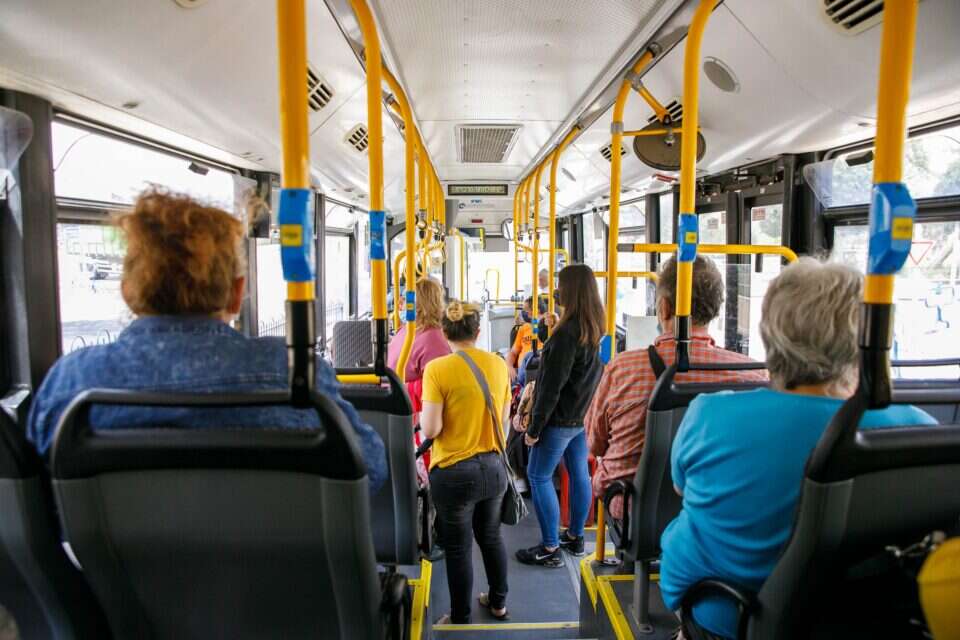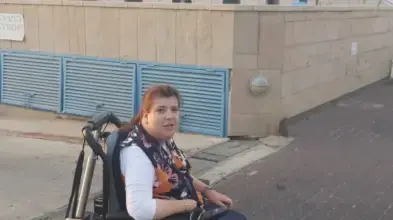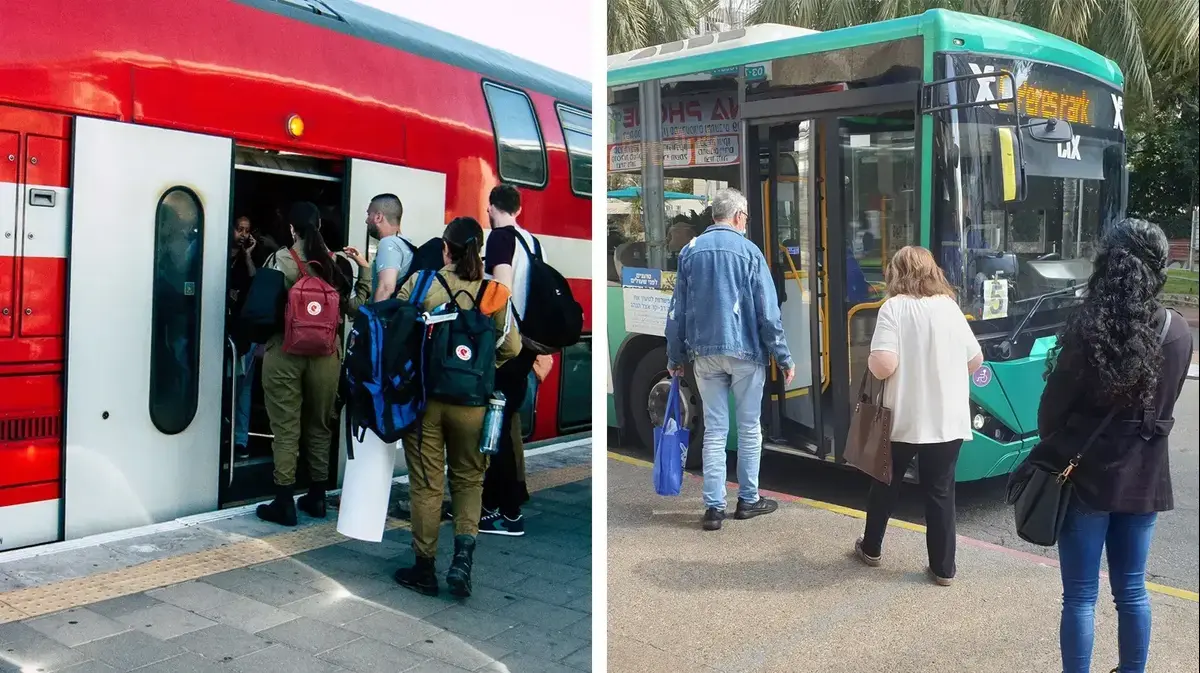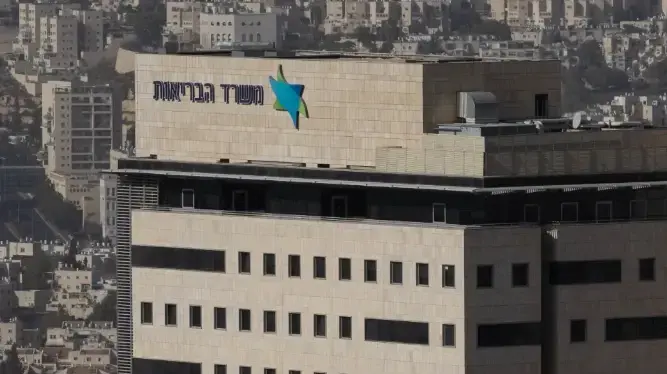There are not enough solutions to make public transportation accessible to people with special needs or disabilities:
This is stated by a special report by State Comptroller Netanyahu Engelman, which is published today (Tuesday).
It should be noted that close to 1.5 million people live in Israel, which is about 7% of the total population, with disabilities. More than 20% of people aged 20 and over are people with disabilities. A large proportion of them have to deal with low earning capacity (75% of people with severe disabilities) and difficulties in financing monthly expenses (19% of people with severe disabilities and 11% of people with moderate disabilities), car ownership (about 63%) and spending Driver's license (about 60%). These difficulties are also accompanied by the difficulty of using the transportation they need to move around independently.
According to the Comptroller, "Adapting the physical and human environment to the physical, sensory, emotional and intellectual abilities of people with disabilities is consistent with the principles of equal rights for people with disabilities, and is an important tier that enables independent, dignified and equal living in the community, and contributes to their functioning. It will bring widespread economic benefits, such as social and economic mobility for people with disabilities, new employment opportunities, savings for special transportation, expanding opportunities for essential services, and raising labor productivity in the economy. "
Wheelchair in an accessible bus (archive),
The Comptroller further notes that public transportation is essential for people with disabilities in order to conduct themselves independently, access to employment services, education and health, and to maintain and integrate community life.
Deficiencies in the application of the duty of sensory accessibility
In his audit, which took place between September 2020 and March 2021, Engelman examined, among other things, the arrival at the shuttle points, the accessibility of the shuttle stations and the accessibility of the means of transportation. He found that there are difficulties in traveling by public transport and that people with disabilities are not satisfied with the accessibility solutions available on existing public transport. Passengers with cognitive or physical disabilities or with visual impairments experience difficulties during most travel on public transportation, while people with hearing or mental disabilities have difficulty getting out of the house, waiting and traveling. Accordingly, the proportion of people with disabilities who use the various transportation services is small, compared to the general population.
It was further found that there is a lack of obligation to make intercity buses accessible in the Equal Rights for Persons with Disabilities Act. Until the end of the audit, the law does not yet stipulate a requirement for physical accessibility of intercity buses. In addition, the Insights Survey and the public participation process revealed that the sensory accessibility requirement of the buses set forth in the regulations (announcement and electronic information) is not fully met and that there are deficiencies in its implementation.
Regarding the accessibility of city buses, there are deficiencies in its accessibility due to the need to improve accessibility in several main areas: There is a problem in adapting the service for people with disabilities, which includes encouraging bus drivers to behave respectfully and considerately
There is no strict adherence to the use of accessibility means such as stopping as close as possible to the curb, using the lowering and ramps, starting a ride after anchoring a wheelchair and operating public address systems.
In addition, there is no strict response times for the operators of public transport (public transportation, SD) regarding complaints regarding accessibility for people with disabilities and strict adherence to the availability and response of an accessibility coordinator on behalf of the public transport operators. Disability At the time of the audit, the Ministry of Transportation did not prepare a comprehensive and detailed plan to address the issue, and the issue of driver training was not reflected in the Ministry of Transportation's inspection reports.
Thousands of bus stops were not made accessible
Accessibility of bus stops and access roads to the stations:
In 2019, there were about 27,000 bus stops in the country.
As of this year, there are about 13,500 municipal stations that have not yet been made accessible and about 3,500 stations for intercity service that are not accessible.
In approximately 37.5% of the 80 localities surveyed, not all stations were accessible, and in 22.5% of the localities surveyed, less than 85% of the stations were accessible.
Also, at the end of the audit, about 16 years after the date of the amendment to the Equality Law, the Minister of the Interior had not yet enacted accessible road regulations.
Control by the Ministry of Transportation: The
Ministry of Transportation did not require public transport operators to provide information on publicity regarding accessible lines, on the installation of static signs and on how to deal with public complaints.
It was further found that the Ministry of Transport did not require the local authorities to list the accessible bus stops.
Israel Railways Accessibility - Travel Coordination for People with Disabilities:
According to the train travel coordination procedure, a person with a disability who wishes to travel by train will coordinate his trip two hours in advance with the company's service center.
The report shows that the number of people with disabilities who can travel at the same time is limited according to the amount of coordination and type of disability.
Tel Aviv Savidor train station platform // Imaging: Israel Railways spokeswoman,
Accessibility at train stations: The
audit examined eight train stations, most of which have convenient and adapted access to the drop-off areas near the entrances to the station and the parking complexes, the entrance hall or the checkpoints at the entrance.
All the stations inspected have bold markings for the traveling public from the points of ascent to and from the train carriages in all the complexes of the passenger halls to the entrance to the stations.
Height differences between the platforms and the carriages:
There are height differences between the platform and the step that helps the passengers enter the caravan.
These differences are significant for passengers in wheelchairs as well as for passengers moving by other means.
The audit also found deficiencies in the licenses granted to accessible taxis.
It was found that licenses were issued in Israel to operate one thousand accessible taxis, in the ratio of one accessible taxi for 1,600 people with disabilities, compared to one taxi for 340 people without disabilities.
In practice, at the end of the audit, about 875 accessible taxis are operating.
Geographical distribution of licenses for accessible taxis: A
look at the list of 19 corporations that hold public rights shows that seven corporations are in the Jerusalem area, four in the Tel Aviv and Central area and six in other areas.
The auditor recommended that the Department of Transportation complete a comprehensive mapping of people with disabilities, which would examine their mobility habits, barriers to their use of public transportation and the reasons for their lack of mobility.
Accordingly, it is advisable to formulate a proposal for ways of government intervention that will ensure treatment of all people with disabilities, including in the matter of technological developments.
It is recommended that the Ministry of Transportation incorporate behavioral monitoring mechanisms for drivers and training drivers, examine the need to update accessibility regulations for public transportation services, including the establishment of training procedures and content, and monitor their implementation, and offer operative actions to operate accessible intercity transportation.
Reduction in maintenance budgets
Another audit carried out by the Comptroller, as a follow-up, is on the activities of Netivei Israel (Nati, SD) in everything related to road maintenance.
The auditor found that most of the deficiencies pointed out in the audit report in 2017 were corrected, and what was not corrected or partially corrected was mainly due to a reduction in the maintenance budget allocated to the company by the Ministry of Transport and the Ministry of Finance.
In a previous audit report, Engelman stated that the Ministry of Transportation and the Ministry of Finance, in cooperation with the company, should check whether the allocation of funds for road maintenance meets the needs, especially in light of the new maintenance model developed by the company in 2017. These actions are essential to enable the company to improve areas where there is still a gap between what is desired and what is available, especially in the areas of travel, layering, road markings and road lighting.
It should be noted that Netivei Israel is a government company responsible for the planning, development and maintenance of the intercity road network in Israel, as well as for the development of railway tracks.
The company is responsible for the inventory of approximately 8,500 km of roads for all their components - roadways, markings and paint, drainage, railings, road signs and signage - including approximately 9,000 road structures and bridges.
Road 4 in Sharon (Archive) // Imaging: Netivei Israel,
In 2017, the State Comptroller published a chapter in the 68A annual report detailing the following shortcomings: reduction of the budget intended for road maintenance at Nati, lack of supervision by the Ministry of Transportation on road maintenance, maintenance of travel not according to a central plan and more.
The follow-up audit revealed that since 2017, the company has taken many actions to correct the deficiencies presented in the previous audit report and to improve the level of maintenance of the roads on all their components. .
It was also found that the budget for 2021-2019 is considerably lower than the budget planned in accordance with the summary from 2016 - from about NIS 1,375 million on average, to about NIS 1,106 million on average in these years (a decrease in rates ranging from 4.72% to 34.4%).
This indicates that this defect has not yet been corrected at the end of the follow-up audit.
Road maintenance and road
layering
: The
company requested to invest NIS 550 million in layering, but in practice only NIS 238 million was approved for it.
The follow-up audit revealed that the volume of road stratification (km) carried out by the company last year decreased by about 37% compared to 2017 - from about 655 km to about 410 km - and that the main reason for this is the lack of budget for stratification of roads. This is expected to continue in 2021, when the decline in 2021 is expected to be even sharper - at a rate of about 91% compared to 2017, from about 655 km to only about 60 km - in accordance with the total budget allocated for this until the end of the audit , Indicates that this bug has not yet been fixed at the end of the follow-up audit.
Unmaintained bridges, unmarked roads
The Ministry of Transportation's supervision and control over the maintenance of bridges, in the previous audit report it was found that "the Ministry of Transportation did not deal with the maintenance of bridges and did not give instructions for their maintenance.
For this reason, the company operates in this field without professional guidance, and the professional guidelines it has prepared regarding the maintenance of bridges have not been approved by any external party. " The Ministry of Transportation has established guidelines and procedures, indicating that this defect has not yet been corrected at the end of the follow-up audit.
It was also found that the budget regarding maintenance of lighting on the roads has decreased and there has been a decrease in the budget dealing with road markings on the roads, which prevents the company from using "long-lived" materials.
Road (illustration), Photo: Liron Moldovan
The Comptroller now states that the Ministry of Transportation and the Ministry of Finance must formulate and approve the maintenance model, since the budget allocation must also address the aspect of the major damage caused by delaying preventive maintenance, damage that may eventually result in fracture maintenance. .
The company must continue to promote the maintenance of bridges on a regular basis, give priority to bridges in inferior maintenance condition and flood the Ministry of Transport and the Ministry of Finance the importance of allocating appropriate budgets for bridge maintenance, both to avoid safety hazards and to reduce maintenance costs.
It is recommended that the Ministry of Transportation and the Ministry of Finance examine the amount of the budget allocated for the purpose of stratifying roads and adapt it to the needs.
Its non-compliance will lead to higher costs in the future for road repairs, as future savings exceed the expected investment.
The rights of multi-line users have not been regulated
Nearly four years after discovering deficiencies in the regulation of multi-line use of public transportation, the State Comptroller states in a follow-up report that most of the deficiencies he pointed out at the time have been corrected. According to Engelman, 2017, including adding stations for charging the card, adding technological means for charging and regulating the use of the card by IDF soldiers and the police.
However, the follow-up report now states that the issue of protecting the privacy of multi-line card users has not yet been settled and the supervisory and enforcement powers of the inspectors have not yet been settled.
It will be recalled that a multi-line ticket was introduced for use in Gush Dan in 2007, and its use was gradually expanded to the entire country and to all public transportation operators (public transport operators). A significant portion of travel expenses in public transport are made through it.
Each year from 2020-2016, an average of 3.5 million active multi-line cards operated.
In 2017, the defects affected, among other things, the issuance and loading of multi-line cards, defects in connection with the restoration of multi-line cards and receipt of refunds, defects in the validation and billing of multi-line cards and defects in calling the service center and backing up its data.
From September 2020 to January 2021, the State Comptroller's Office conducted a follow-up audit.
The current audit also examined the Ministry of Transportation's preparations for cyber incidents regarding the data set of multi-line users, and the use of widgets (applications, SD) for receiving services in the IDF, which began on 15.12.20.
The follow-up audit revealed that although legislative proceedings were initiated to amend the Traffic Ordinance in 2018, a legislative regulation of the supervisory and enforcement powers in public transportation regarding travel free of charge or without ticket validity has not yet been completed.
The follow-up audit revealed that the deficiency in this issue had been corrected to a small extent.
Riding the light rail in Jerusalem using a multi-line ticket, Photo: Lior Mizrahi
Determining an increased fare for travel free or without ticket validity: The
audit report from 2017 stated that the Ministry of Transportation should examine the possibility of setting various increased fares, and that it should consider distinguishing between travel that the passenger did not pay for and travel paid for, but the ticket did not Validity The error in this issue has not been fixed.
"Danger of damage to passenger service"
Regarding the regulation of the use of multi-line cards - a report from 2017 stated that the legislative procedure for regulating the use of multi-line cards lasted for many years, and therefore the Ministry of Transportation must examine how the legislative process can be promoted. In particular, the rights of users, the activities of issuers, the powers of enforcement and the protection of the privacy of users of multi-line cards have not been regulated, even though more than 10 years have passed since the date of the bill prepared by the Ministry of Transport (2010). This issue has not been corrected.
Regarding the protection of the privacy of multi-line card users: The
audit report from 2017 stated that the issue of protecting the privacy of multi-line card users has not yet been regulated by law, and therefore the guidelines for the Law, Technology and Information Authority in the Ministry of Justice (now the Privacy Protection Authority) The interim measures, set in April 2012, have been in force for five years. Technology and information in the Ministry of Justice published in 2012 is still valid, even though more than eight years have passed since the publication. The follow-up audit revealed that the defect in this matter had not been rectified.
The same applies to the backup of the service center, since the same report stated that "there is no backup site for the multi-line card system but only for data, which increases the risk of damage to passenger service and revenue due to an attack or malfunction in the service center." Under the care of the Ministry of Transportation, which issued a tender in January 2021 to provide services to public transport users who hold a multi-line ticket.
The follow-up audit revealed that the deficiency in this issue had been corrected to a small extent.
The auditor notes positively the arrangement of the issue of multi-line card restoration and receipt of refunds so that a passenger can receive a refund or restore a card at the end of 72 hours.
Many complaints have been made recently by the older population about the difficulty of using apps and citizens' complaints about usage positions.
The Comptroller now states that "the Ministry of Transport should act to obtain segmented information on the activity of the franchisees in the service stations, in order to check the trends in the use of the service stations, and accordingly to improve the service in accordance with its objectives. A population that has difficulty moving and for a population that has difficulty using the technological means available today. "









